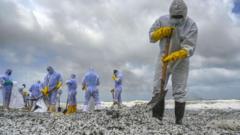In southern Vietnam, Nguyen Thi Ngoc Diem's life has been indelibly marked by the consequences of the U.S. military's use of Agent Orange during the Vietnam War. Born with a misshapen spine and limbs likely due to her father's exposure to the toxic chemical, Diem has felt the slow-moving devastation of war-related toxins throughout her life. After receiving training from a project funded by U.S. A.I.D. in 2022, she secured employment in graphic design, igniting a flicker of hope that soon dimmed when the company recently shut down.
Diem awaited further assistance that was promised, such as a new computer or a small loan to continue her work. However, she faced grim news: President Trump's government had frozen U.S. A.I.D. funding and cut staff from the agency responsible for such humanitarian efforts. "It makes no sense," she lamented from her wheelchair, a crucifix looming behind her.
“A little support for people like us means a lot,” she pointed out, recognizing the responsibility the U.S. bears for the consequences of its wartime actions. Yet, with funding abruptly severed, victims like Diem are left grappling with uncertainty and despair over their already fragile futures.
The cessation of assistance marks a significant abandonment by the U.S., affecting those directly impacted by its historical military actions. The contrast between Diem’s expectations of support and the lack of fulfillment underscores a troubling chapter in U.S.-Vietnam relations, where promises made seem to evaporate under political decisions of the present.






















